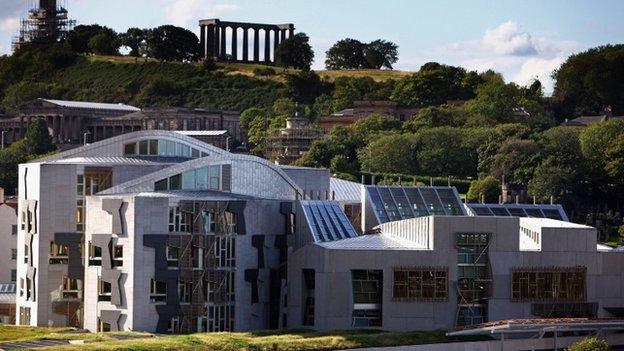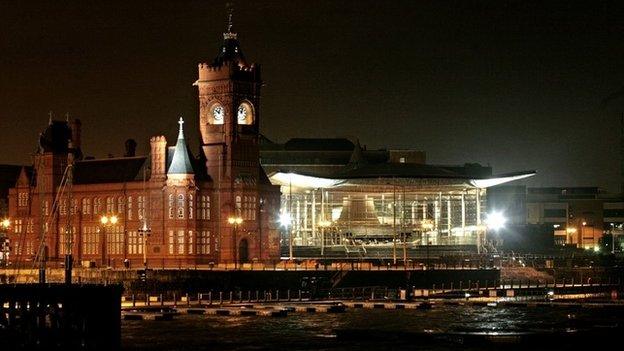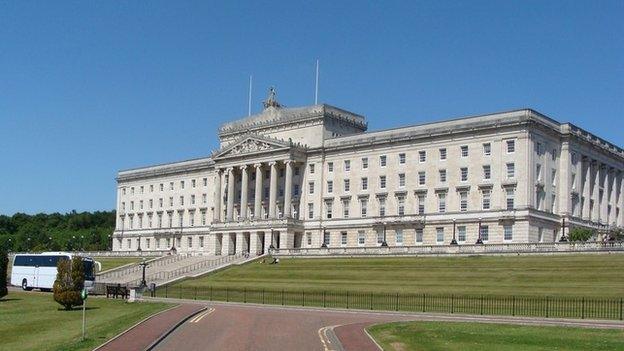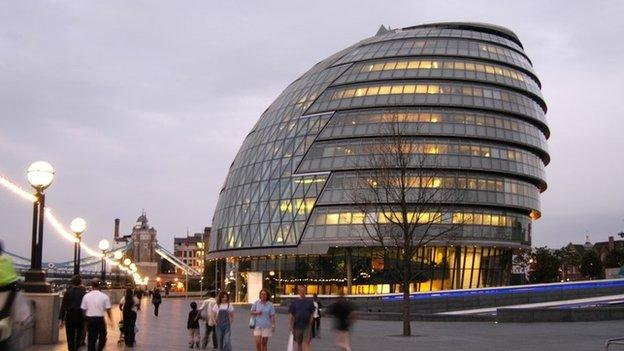Election 2015: A short guide to devolution in the UK
- Published
The general election on 7 May will determine who is in charge at Westminster, but the UK government's power to make laws across the land is limited.
Many functions have been passed to Scotland, Wales and Northern Ireland, which have their own elected bodies. However, they don't all share the same level of authority.
How did it happen?
There have long been important distinctions in the way different parts of the UK work - for example, the separate education and legal systems in Scotland. But in 1997, devolution - the transfer of some powers from central to regional bases - entered a new phase.
That year, referendums were held in Scotland and Wales, with both parts of Ireland following in 1998.
These resulted in the creation of the Scottish Parliament, the National Assembly for Wales and the Northern Ireland Assembly.
Another major shake-up came in the form of 2014's Scottish referendum. Although voters said "No" to full independence for Scotland, the period leading up to the vote led to an intense debate over what Scotland should be able to decide for itself.
The debate has already resulted in more powers being offered to the Scottish Parliament - and is likely to influence how the process of devolution continues, not just in Scotland, but across the UK.

Which powers are devolved?
The table below gives an overview of the main powers given to the Northern Irish and Welsh assemblies, and the Scottish Parliament.
* Scotland has always had its own legal system

Which powers are not devolved?
The UK government, led by the prime minister in Downing Street, is responsible for national policy on all powers which have not been devolved - known usually as "reserved powers".
The main areas which are reserved to Westminster are:
The constitution
Defence and national security
Foreign policy
Immigration and citizenship
Energy
Social security (devolved in Northern Ireland)
Pensions
Most forms of tax (soon to change in Scotland)


Scotland
The Scottish Parliament sits at Holyrood in Edinburgh and is made up of 129 elected Members of the Scottish Parliament (MSPs), who scrutinise and pass bills in various areas of its many devolved responsibilities.
In addition to the main devolved powers, the Parliament can legislate on tourism, planning, natural and built heritage, sport and the arts, statistics, public registers and records.
But Holyrood will soon get control over more areas of Scottish life.
In the wake of the "No" vote in the Scottish independence referendum, all parties participated in the Smith Commission, which recommended:
Full control over income tax rates and bands, and air passenger duty
A share of VAT should be assigned to the Scottish Parliament
Control over certain types of benefit payments.
Backed by the three largest pro-Union parties, these changes form the basis of legislation which is expected to be passed after the general election.
The SNP, which currently controls the Scottish government at Holyrood, maintains the Smith Commission blueprint falls short of the mark and continues to argue for full independence.


Wales
The National Assembly for Wales sits at the Senedd in Cardiff Bay, and is made up of 60 elected Assembly Members (AMs). The Welsh government is its executive branch.
Since 2011 the Welsh assembly has had primary law-making powers over devolved areas, and in 2014 it gained tax-raising powers including stamp duty and landfill tax.
Arrangements are also in place for some powers over income tax, subject to approval in a referendum.
In addition, the assembly can make laws relating to ancient monuments and historic buildings, public administration, sport and recreation, tourism, town and country planning, flood defences, the assembly itself, and the Welsh language.
Constitutional upheaval in Scotland helped focus fresh attention on devolution to Wales, with UK ministers promising "ambitious" further proposals by March 2015.
This is expected to include a "reserved powers framework" for the Welsh assembly, meaning everything is considered to be devolved to Wales unless legislation specifically says that it is not.


Northern Ireland
The Northern Ireland Assembly sits at Stormont in Belfast, and is made up of 108 elected Members of the Legislative Assembly (MLAs).
The power-sharing agreement between the nationalist and unionist communities in Northern Ireland is critical to the functioning of the assembly; devolution of powers has been suspended and reinstated several times since it started in 1998.
Devolution here is slightly different to Scotland and Wales, with government powers divided into three categories: transferred, reserved and excepted.
Reserved powers - which could be transferred in the future with cross-community consent - include prisons and civil defence
Excepted powers - including parliamentary and assembly elections, international relations and defence - cannot be transferred without primary legislation from Westminster
In addition to the main devolved powers, the assembly can also legislate on culture, arts and leisure, learning and employment and regional and social development.
In March 2010, an agreement was passed to transfer powers of justice and policing to Northern Ireland.


England
As devolution to Scotland, Wales and Northern Ireland has gathered pace, many people have argued there is not enough devolution to and within England.
There are two particular sources of tension.
The Treasury gives block grants to Scotland, Wales and Northern Ireland to spend on devolved policy areas, calculated through the Barnett formula on the basis of population.
Scottish, Welsh and Northern Irish MPs' can vote on laws that only apply in England - which some people believe should be addressed through English votes on English laws, the idea that only English MPs should be able to vote on laws which predominantly affect England.
The Barnett formula is set to be revised as Scotland gets more tax-raising powers, but it is not clear whether there will be any similar reconsideration of the way it funds Wales and Northern Ireland.
The parties at Westminster disagree over the best way to address the puzzle of which MPs get to vote on which laws, and have set out competing solutions.
On top of that, there have been renewed calls for devolution to England's cities and regions.